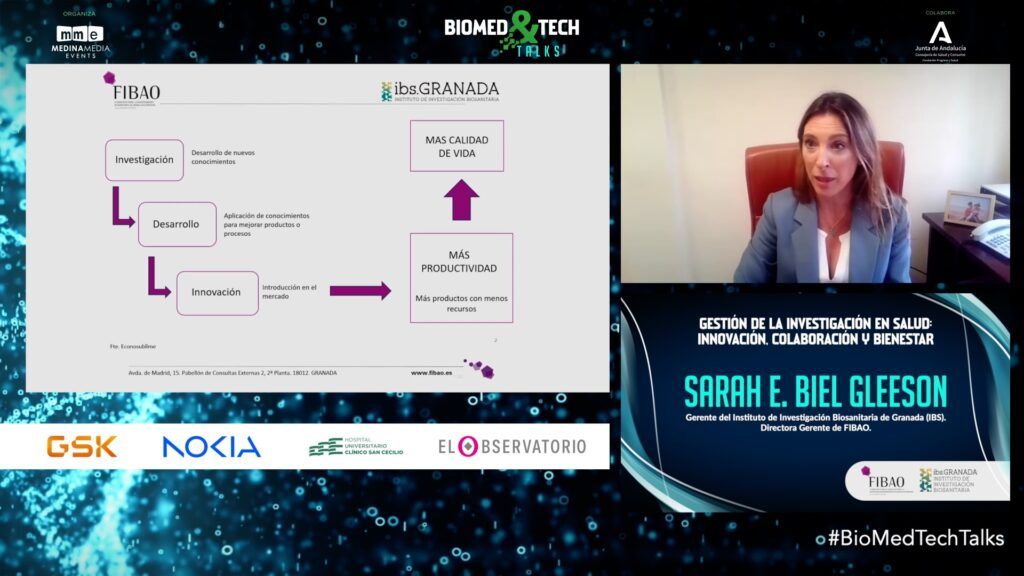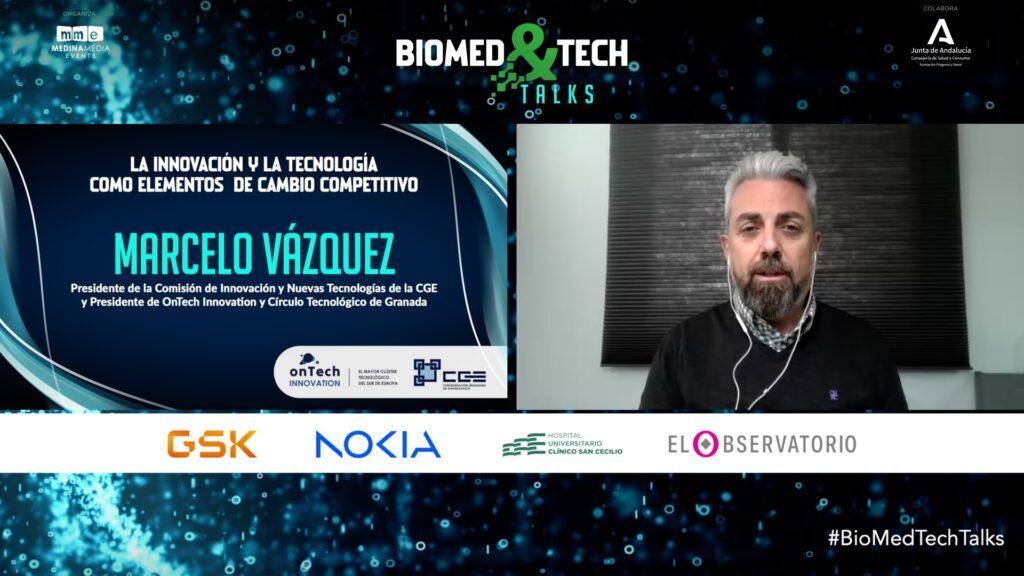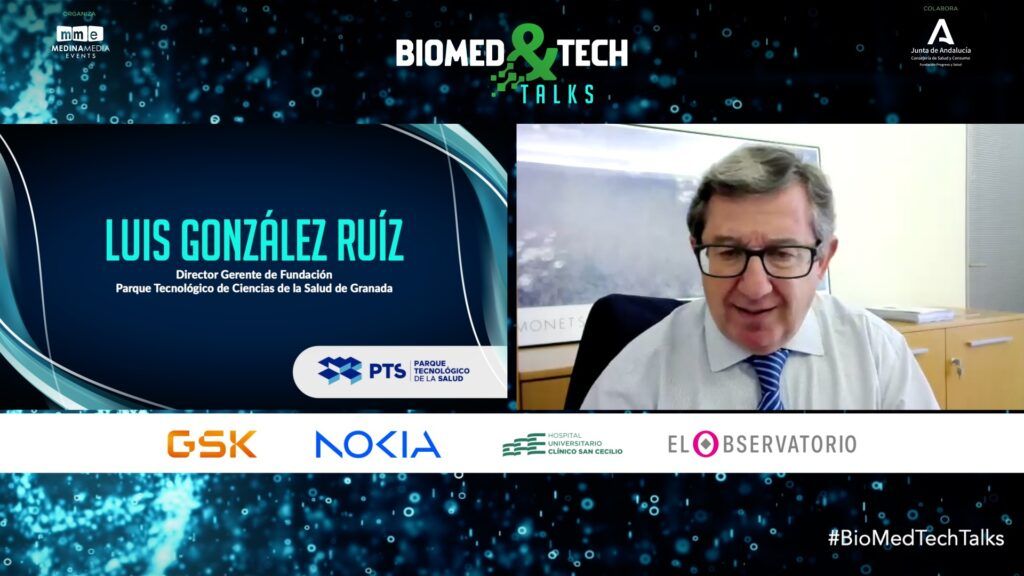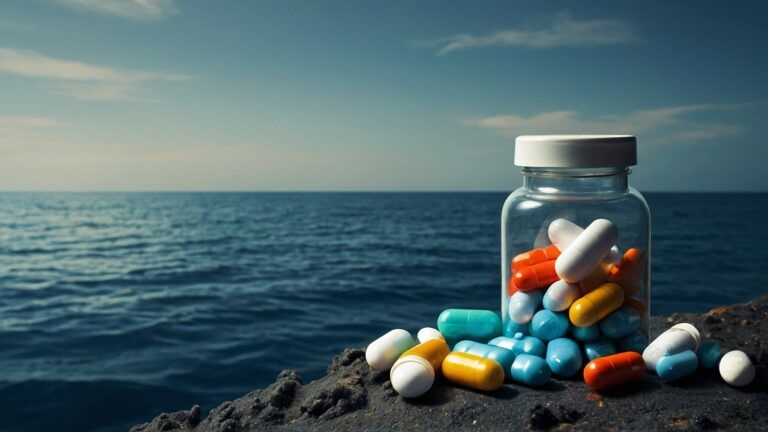-
Olga Genilloud, scientific director of the MEDINA Foundation (Innovative Medicines in Andalusia), also noted that “more than 50% of the drugs we use are derived from or inspired by natural products”.
-
The president of the Innovation and New Technologies Commission of the Confederación Granadina de Empresarios, Marcelo Vázquez, who is also president of the onTech Innovation Cluster, has warned of the “great imbalance between the demand for talent and what academic institutions offer”.
-
Sarah Biel Gleeson, manager of ibs.GRANADA (Instituto de Investigación Biosanitaria) and managing director of the FIBAO Foundation, has highlighted the “need for grants to support researchers”.
-
The Granada Health Technology Park (PTS), whose director, Luis González, has participated in this first edition of ‘BioMed & Tech Talks’, has become an ecosystem of constant connection between business development, research, healthcare and teaching.
The third day of ‘BioMed & Tech Talks: Your appointment with research and innovation’ has highlighted the biosanitary and biotechnological ecosystem of Granada, with special attention to the Health Technology Park (PTS), where the University of Granada, Health Institutes, companies, centers and foundations such as the MEDINA Foundation (Innovative Medicines in Andalusia), a leading research center in the discovery of drugs from natural products of microbial origin.
More than 50% of the drugs we use are derived from natural products.
Olga Genilloud, scientific director of the MEDINA Foundation, shared her experience at this research center, which works with more than 190,000 strains of bacteria and fungi and also has a library of 200,000 natural products for discovering new drugs. Precisely these “natural products are an excellent starting point for the design of new compounds”. In fact, today “more than 50% of the drugs we use are derived from or inspired by natural products”.

For the scientific director of the MEDINA Foundation, it is worrying that there have only been six new classes of antibiotics since 2000, which means that “the catalog of compounds in the clinic and the agents approved today are insufficient to address the future control of the increase in microbial resistance”. For this reason, Olga Genilloud considered that the lack of new antibiotics “is a problem that we have to address and solve collectively”. And among other environments, “the sea becomes a great source of resources for the discovery of new drugs”.
Financial aid, vital for research development
Within this biosanitary and biotechnological ecosystem in Granada is the ibs.GRANADA (Institute of Biosanitary Research). Its manager, Sarah Biel Gleeson, who is also the managing director of the FIBAO Foundation, has opened the doors of these two centers focused on health research, whose “main aim is to seek more quality of life and improvement in the wellbeing of our patients”. With advanced therapies as the main line of research, for Sarah Biel the “support aids for researchers are basic to offer them stability” thanks, for example, to initiatives such as the State Network Consortium for the Development of Advanced Therapy Medicines (CERTERA) or the IMPaCT Cohort network, which have resulted in several million euros of funding for these research centers.

“In the last year, by changing internal management processes, we have increased our turnover in clinical research by 60%. Our goal is to promote research and collaboration with industry because the main beneficiary is the patient,” Sarah Biel emphasized as the key to this success story.
Andalusia, ready for the challenge of the talent mismatch
The president of the Innovation and New Technologies Commission of the Confederation of Businessmen of Granada, Marcelo Vázquez, who is also president of the onTech Innovation Cluster, the most important cluster of technology companies in Andalusia, has highlighted the privileged position in which the region finds itself to respond to the challenge of the “talent mismatch”. And in particular Granada, where the technology sector is growing at over 7% of the province’s GDP and will continue to grow in the not too distant future thanks to the expansion of the PTS (Health Technology Park) and the development of one of the projects that are generating the greatest expectation throughout Europe: the IFMIF-Dones particle accelerator.

Although there are very good expectations, the current reality is quite different, because, according to Marcelo Vázquez, “there is a great imbalance between the demand for talent and what is offered by academic institutions” such as the University or Vocational Training. For the president of Cluster onTech Innovation and Círculo Tecnológico, this is the reality that worries in terms of employment. Both associations are working on what has come to be called a third industrial revolution -in this case technological- in Granada with three major projects at the center of everything: a strategic plan for Artificial Intelligence, the expansion of the PTS and the IFMIF-Dones.
PTS, an ecosystem in constant growth
Since its launch in the mid-1990s, the Granada Health Technology Park (PTS) has become an ecosystem of constant connection between business development, research, healthcare and teaching. Its managing director, Luis González, shared in ‘BioMed & Tech Talks’ the functioning of this enclave “unique in Europe”, which places Granada and Andalusia at the forefront of biomedicine and biotechnology. Nearly 200 companies are installed in the PTS within a broad spectrum in which “biomedicine, laboratories, research, biotechnology and also Artificial Intelligence coexist”.

With the task of “preparing and promoting synergies” under the four axes that make up the Park, one of the great challenges of the PTS in the medium term is that of “growth in space, since 95% of the area is already occupied”. In addition, a growth in projects and companies, which will surely come with the implementation of the IFMIF-Dones particle accelerator.
Innovative format
Tomorrow, Thursday, the last day of BM&TTalks will be held and the main topics will be Alzheimer’s disease, Nanotechnology or high-level research in infectious diseases.
All presentations can be viewed through ‘The Observatory’, the digital platform of Medina Media Events, where all interventions will also be available 24/365 for on-demand consumption, like Netflix, but free of charge.
The first edition of ‘BioMed & Tech Talks’ is organized by Medina Media Events in collaboration with the Fundación Progreso y Salud of the Consejería de Salud y Consumo de la Junta de Andalucía and is supported by GSK, Nokia, El Observatorio and the Hospital Clínico Universitario San Cecilio. Also collaborating are IAVANTE, Andalucía TRADE, ASEBIO, Wellness Forum and Granada Convention Bureau, among others.
